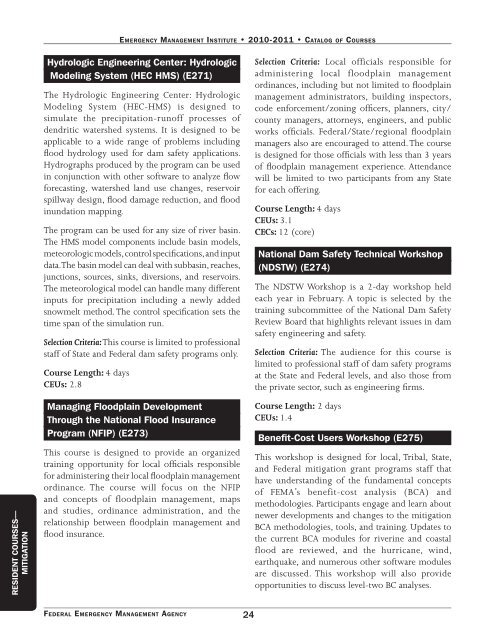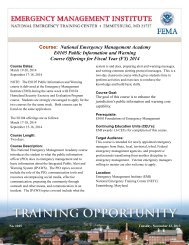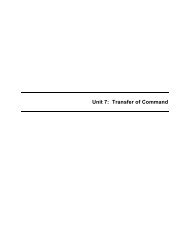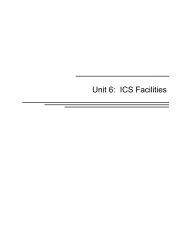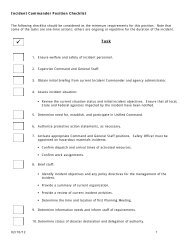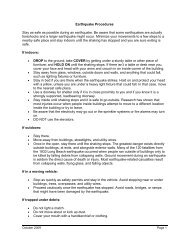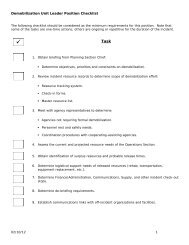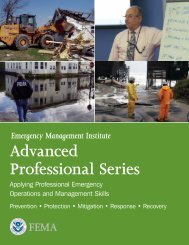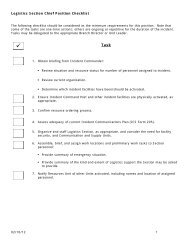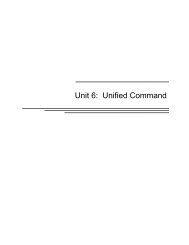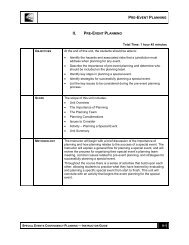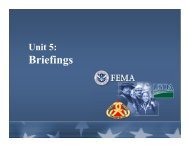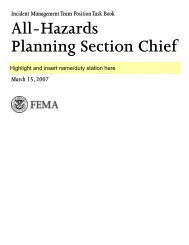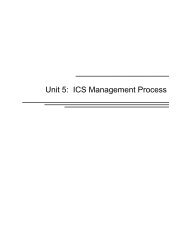enrollment for emi courses - Emergency Management Institute ...
enrollment for emi courses - Emergency Management Institute ...
enrollment for emi courses - Emergency Management Institute ...
Create successful ePaper yourself
Turn your PDF publications into a flip-book with our unique Google optimized e-Paper software.
EsIDEnt cOursEs—<br />
mItIgatIOn<br />
EmE r g E n c y ma n a g E m E n t In s t I t u t E • 2010-2011 • ca t a l o g of co u r s E s<br />
Hydrologic Engineering center: Hydrologic<br />
modeling system (HEc Hms) (E271)<br />
The Hydrologic Engineering Center: Hydrologic<br />
Modeling System (HEC-HMS) is designed to<br />
simulate the precipitation-runoff processes of<br />
dendritic watershed systems. It is designed to be<br />
applicable to a wide range of problems including<br />
flood hydrology used <strong>for</strong> dam safety applications.<br />
Hydrographs produced by the program can be used<br />
in conjunction with other software to analyze flow<br />
<strong>for</strong>ecasting, watershed land use changes, reservoir<br />
spillway design, flood damage reduction, and flood<br />
inundation mapping.<br />
The program can be used <strong>for</strong> any size of river basin.<br />
The HMS model components include basin models,<br />
meteorologic models, control specifications, and input<br />
data. The basin model can deal with subbasin, reaches,<br />
junctions, sources, sinks, diversions, and reservoirs.<br />
The meteorological model can handle many different<br />
inputs <strong>for</strong> precipitation including a newly added<br />
snowmelt method. The control specification sets the<br />
time span of the simulation run.<br />
Selection Criteria: This course is limited to professional<br />
staff of State and Federal dam safety programs only.<br />
Course Length: 4 days<br />
CEUs: 2.8<br />
managing floodplain Development<br />
through the national flood Insurance<br />
program (nfIp) (E273)<br />
This course is designed to provide an organized<br />
training opportunity <strong>for</strong> local officials responsible<br />
<strong>for</strong> administering their local floodplain management<br />
ordinance. The course will focus on the NFIP<br />
and concepts of floodplain management, maps<br />
and studies, ordinance administration, and the<br />
relationship between floodplain management and<br />
flood insurance.<br />
FEd E r A L Em E r g E N C y mA N A g E m E N T Ag E N C y 24<br />
Selection Criteria: Local officials responsible <strong>for</strong><br />
administering local floodplain management<br />
ordinances, including but not limited to floodplain<br />
management administrators, building inspectors,<br />
code en<strong>for</strong>cement/zoning officers, planners, city/<br />
county managers, attorneys, engineers, and public<br />
works officials. Federal/State/regional floodplain<br />
managers also are encouraged to attend. The course<br />
is designed <strong>for</strong> those officials with less than 3 years<br />
of floodplain management experience. Attendance<br />
will be limited to two participants from any State<br />
<strong>for</strong> each offering.<br />
Course Length: 4 days<br />
CEUs: 3.1<br />
CECs: 12 (core)<br />
national Dam safety technical workshop<br />
(nDstw) (E274)<br />
The NDSTW Workshop is a 2-day workshop held<br />
each year in February. A topic is selected by the<br />
training subcommittee of the National Dam Safety<br />
Review Board that highlights relevant issues in dam<br />
safety engineering and safety.<br />
Selection Criteria: The audience <strong>for</strong> this course is<br />
limited to professional staff of dam safety programs<br />
at the State and Federal levels, and also those from<br />
the private sector, such as engineering firms.<br />
Course Length: 2 days<br />
CEUs: 1.4<br />
benefit-cost users workshop (E275)<br />
This workshop is designed <strong>for</strong> local, Tribal, State,<br />
and Federal mitigation grant programs staff that<br />
have understanding of the fundamental concepts<br />
of FEMA’s benefit-cost analysis (BCA) and<br />
methodologies. Participants engage and learn about<br />
newer developments and changes to the mitigation<br />
BCA methodologies, tools, and training. Updates to<br />
the current BCA modules <strong>for</strong> riverine and coastal<br />
flood are reviewed, and the hurricane, wind,<br />
earthquake, and numerous other software modules<br />
are discussed. This workshop will also provide<br />
opportunities to discuss level-two BC analyses.


